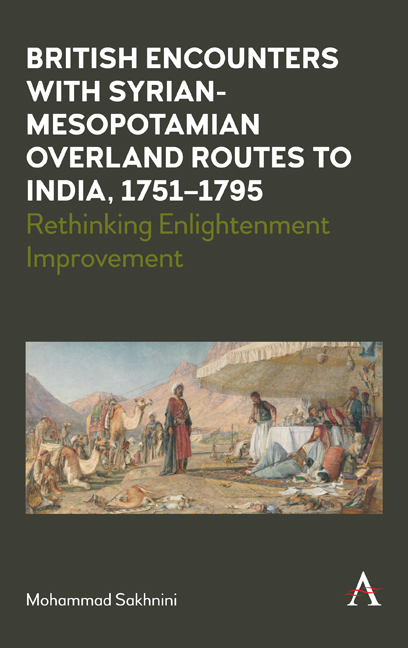 British Encounters with Syrian-Mesopotamian Overland Routes to India, 1751-1795
British Encounters with Syrian-Mesopotamian Overland Routes to India, 1751-1795 Book contents
- Frontmatter
- Contents
- Acknowledgment
- Introduction: Pluralising The Enlightenment: Improvement And Cross-Cultural Encounters
- Chapter One Improvement of Knowledge: John Carmichael’s A Journey From Aleppo to Busserah, Over the Desert (1772)
- Chapter Two Polite Englishman in the East: Edward Ives’s Journey from Persia to England (1773)
- Chapter Three Commerce, Virtue and Improvement: Abraham Parsons’s Travel in Asia and Africa (1808)
- Chapter Four Henry Abbott: A Cosmopolitan in Cities and Deserts
- Chapter Five Eyles Irwin’s Travels: The Politics of Adventure in the Levant
- Chapter Six Political and Moral Improvement: Donald Campbell, A Journey Overland to India Partly by A Route Never Gone Before by Any European (1795)
- Conclusion
- Unpublished Manuscripts
- Reference List
- Index
Chapter Three - Commerce, Virtue and Improvement: Abraham Parsons’s Travel in Asia and Africa (1808)
Published online by Cambridge University Press: 15 November 2023
- Frontmatter
- Contents
- Acknowledgment
- Introduction: Pluralising The Enlightenment: Improvement And Cross-Cultural Encounters
- Chapter One Improvement of Knowledge: John Carmichael’s A Journey From Aleppo to Busserah, Over the Desert (1772)
- Chapter Two Polite Englishman in the East: Edward Ives’s Journey from Persia to England (1773)
- Chapter Three Commerce, Virtue and Improvement: Abraham Parsons’s Travel in Asia and Africa (1808)
- Chapter Four Henry Abbott: A Cosmopolitan in Cities and Deserts
- Chapter Five Eyles Irwin’s Travels: The Politics of Adventure in the Levant
- Chapter Six Political and Moral Improvement: Donald Campbell, A Journey Overland to India Partly by A Route Never Gone Before by Any European (1795)
- Conclusion
- Unpublished Manuscripts
- Reference List
- Index
Summary
There is scarce any country how rude or uncultivated soever, where the inhabitants are not possessed of some peculiar secrets, wither in nature or art, which might be transplanted with success.
—Oliver Goldsmith, Citizen of the World (1760–1761)The Levant Company appointed Abraham Parsons as a consul in Iskenderun, Turkey, in 1767. Parsons served in the Levant for six years before deciding to retire in Leghorn in Italy where he died in 1785. Seven years earlier, Parsons had undertaken a journey of ‘commercial speculations’, as John Paine Berjew, the editor of Parsons’s travel account, wrote in the preface to Parsons’s Travels in Asia and Africa (Parsons 1808: iii). From his travel book, we learn that Parsons had joined an Arab caravan travelling between Aleppo and Basra where he lived for a few months before boarding a British ship sailing towards India. In 1776, he arrived in Bombay, then moved to Surat and Madras before returning to Europe by way of Suez, Cairo and Alexandria. The details of this long journey were published posthumously in 1808 in a book many in Britain found somewhat repetitive and dull unlike most travel books of the period, which were known for the stories they told about their authors’ adventures and suffering in exotic climes. The Monthly Review suggested that Parsons’s ‘travels bespeak the man of business more than the man of letters and afford us the result of actual observation without much benefit from disquisition or research’ (1810: 288). For the London Review, there is no doubt that Parsons’s book lacks the literary and scholarly quality one finds in previous and contemporary accounts about the Levant. But what is even odd about the book is that it does little to explain differences between societies beyond just the Enlightenment discourse of progress. Parsons, The London Review in 1809 wrote, ‘looks only on the artificial and obvious distinction between the modes of society in states: he knows nothing of the more recondite discriminations that separate, as it were, the souls of communities; and even, in the midst of the most liberal and enlightened intercourse, keep nation distinct from nation.
- Type
- Chapter
- Information
- British Encounters with Syrian-Mesopotamian Overland Routes to India, 1751-1795Rethinking Enlightenment Improvement, pp. 95 - 132Publisher: Anthem PressPrint publication year: 2023


